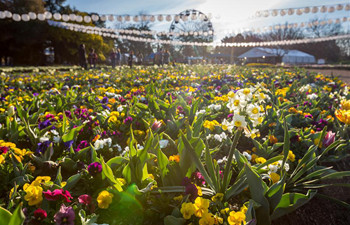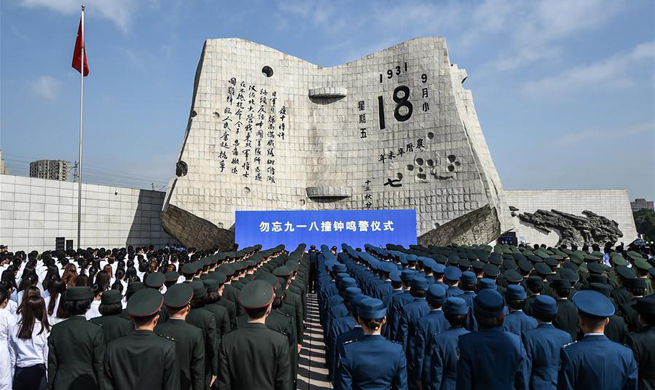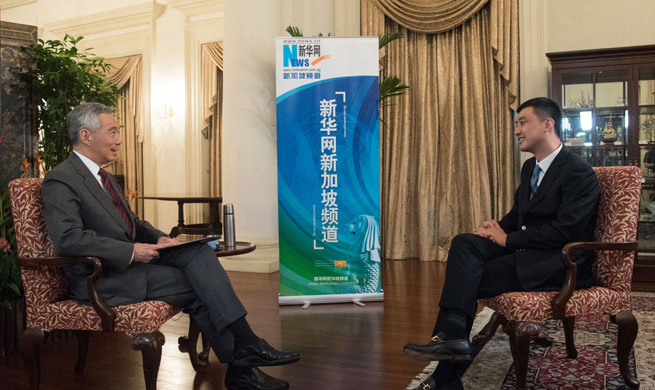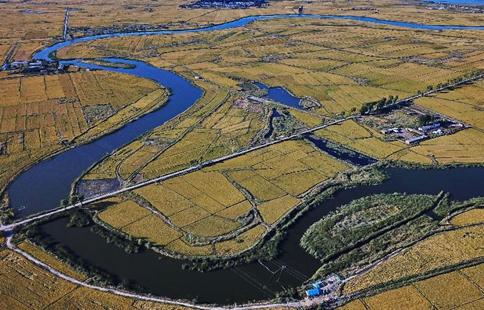THE HAGUE, Sept. 18 (Xinhua) -- A special conference to boost local cooperation between the Netherlands and China in the framework of the Belt and Road Initiative was held Monday in The Hague, with hundreds of representatives from provincial and municipal governments and companies from both countries participating.
"The Belt and Road Initiative is important for China, the world, and especially for the Netherlands. The investment made by the Chinese government is enormous. The infrastructure challenge is never seen before and will connect more than 165 countries all over the world," said Henk Kool, president of the Netherlands-China Association (VNC in Dutch), and co-organizer of the event.
"It offers new opportunities for Europe and the Netherlands taking into account that the new infrastructure by land and by sea, starting in China and ending in the Netherlands," Kool said.
"There is no doubt the Netherlands will profit from this initiative. And that is why Dutch municipalities have to prepare themselves for this new development," he said.
"Dutch and Chinese municipalities have to connect and encourage their local companies to expand and to inspire and give a new impulse to the old urban ties," said Kool, whose association of volunteers has been engaged in promoting the friendship between the Netherlands and China for four decades.
The Belt and Road Initiative, put forward by China in 2013, is aimed at building the Silk Road Economic Belt and the 21st Century Maritime Silk Road through concerted efforts of all related countries to benefit all participants by promoting unimpeded trade, financial integration, infrastructure connectivity and closer people-to-people exchanges.
On the first day of the event, delegations from Chinese and Dutch provinces and cities, together with companies in search of partners, attended the plenary conference and parallel sessions on various subjects of mutual interest such as sustainable urbanization, agriculture and food safety, going-global investment, education, cultural differences, and ethics.
A total of 29 sister cities have been paired between the two countries since Shanghai and Rotterdam became sister cities in 1979, according to Song Jingwu, vice-president of the Chinese People's Association for Friendship with Foreign Countries (CPAFFC), which launched the event together with VNC to create a platform for exchange and liaison.
"Local cooperation, for which sister-city relations constitute an important channel, lays an important basis for bilateral relations. We do hope that participants of this conference explore new ways of cooperation brought by the Belt and Road Initiative and build closer links," said Song.
"I have experienced that meeting each other face-to-face is important to develop mutual understanding and to identify opportunity for cooperation. And that a strategic approach involving businesses is crucial to translate these opportunities into tangible results," echoed Jaap Smit, the Dutch King's Commissioner in the province of Zuid-Holland, of which The Hague is the capital city.
The sister cities of Zuid-Holland and the Chinese Province of Hebei were recognized as exemplary by the Chinese government in 2010.
For Wang Xuefeng, deputy chairman of the Standing Committee of Hebei Provincial People's Congress, Dutch knowledge on climate change, green cities, water management, and soil remediation had greatly contributed to the pursuit of sustainability in his province.
Another voice supporting cooperation at the local level was the Dutch foreign ministry.
"Next to exchanges at national level, numerous contacts take place at sub-national level. The steady flow of exchanges forms the bedrock of our relationship," said Yoka Brandt, Secretary-General of the Dutch foreign ministry.
"This year our country is celebrating 45 years of diplomatic relations at the ambassadorial level with China. Over these 45 years, we have witnessed China's unprecedented transformation. China has now well established itself as the world's second largest economy and is playing an increasingly important role on the global stage and is therefore essential to finding solutions to global challenges," Brandt told the conference.
"Forty-five years ago, there were less than 1000 people-to-people visits between our two countries. The figure now is more than 1.3 million, among which are 300,000 Chinese tourists choosing the Netherlands as their first destination," noted Wu Ken, China's Ambassador to the Netherlands.
"Exchange and understanding between our people is the lubricant for the development of bilateral relations," Wu said.
Recalling the establishment sister cities Rotterdam and Shanghai, and between Eindhoven (headquarters of the Dutch giant Philips) and Nanjing nearly 20 years ago, Peter Potman, director of Asia Pacific at the Dutch ministry of foreign affairs, said that back then, the relationship was about the Dutch companies investing in China.
"Now the world is shifting and the relationship between the Netherlands and China is shifting. In the future, it will become more important for Chinese businesses to come to the Netherlands," Potman said.
"The cities and provinces supported by the national government should work very hard for making the shift from 'going out to China' to concentrating more on getting Chinese visitors to the Netherlands," said Potman, who served as Dutch consul-general in Shanghai for more than three years.
"And our ministers should not only go to Beijing and Shanghai but also to Hainan, Guangdong, Sichuan and beyond. Because that is where the future is taking place. That is also the meaning of the Belt and Road Initiative -- linking cities, companies, provinces and people," he concluded.


















